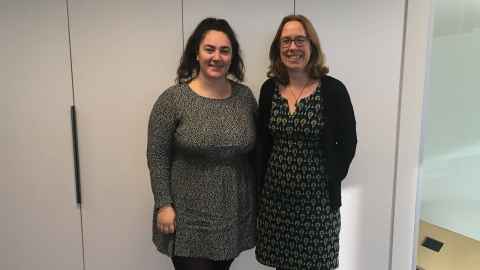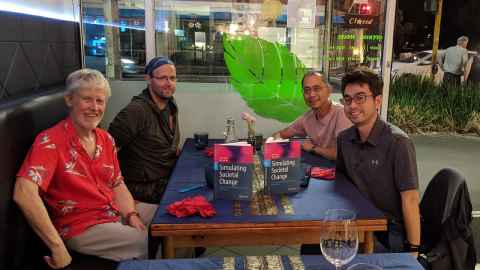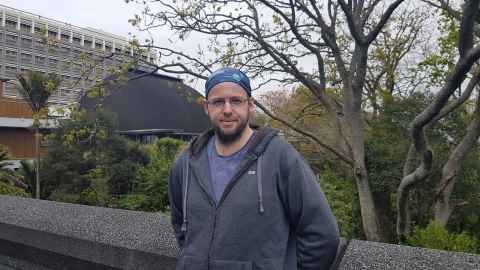COMPASS seminars 2019
In Semester Two 2019, we hosted seminars in the space of our new COMPASS offices, Sir Owen G Glenn Building, Room 622.
Everything is Fine: Informative non-significant findings from a large representative sample
Dr Sam Stronge
Tuesday 22 October @ 12 Grafton Road, 12PM
Ideas about our worsening society tend to be popular and easily accepted; increasingly narcissistic youth, the dangers of social media, and spoiled only-children. In this seminar I present data from the New Zealand Attitudes and Values Study, a large nationally representative sample of adult New Zealanders, showing little evidence for these claims. I discuss the utility of non-significant findings when using large sample sizes and appropriate statistical analyses.
Sam Stronge is a research fellow working with the New Zealand Attitudes and Values Study. She completed her PhD at the University of Auckland in 2017. Her research focuses on topics such as narcissism and self-esteem, and largely utilises quantitative and longitudinal methods.
Rainbow Experiences of Accessing Mental Health Support in Aotearoa: A community-based mixed methods study

Gloria Fraser
Friday 18 October @ 12 Grafton Road, 1PM
A substantial body of literature documents the high rates of mental health problems in rainbow communities, but little is known about the experiences of sex, sexuality, and gender diverse people who access mental health support in New Zealand. In collaboration with rainbow community organisations we used mixed methods to extend current understandings, then developed a practice resource based on our findings for use by New Zealand’s mental health professionals.
In the initial phase of the project we interviewed 34 rainbow young adults (aged 16–30) who had accessed mental health support. Data were analysed using thematic analysis. This study highlighted a need for increased training about sex, sexuality, and gender diversity among New Zealand’s mental health professionals. Findings also emphasised the importance of taking an affirmative approach in therapy that directly counters the effects of discrimination, and highlighted barriers to accessing gender-affirming healthcare. Results from a subsequent online survey (n = 1,575) closely reflected our interview findings. In this presentation, I provide an overview of our analysis and results, discuss key methodological decisions, and reflect on the research and resource development process.
Gloria Fraser (Ngāi Tahu) is a PhD and Clinical Psychology student at Victoria University of Wellington. She is particularly interested in the intersection of sex-sexuality-gender diversity and mental health. She was born and raised in Auckland and completed her Bachelor of Arts in Psychology and Philosophy at the University of Auckland. Gloria has worked in various support roles for Youthline New Zealand, Work and Income, the Anxiety Trust New Zealand, and local feminist organisations. She also spent several years working as research assistant for the New Zealand Attitudes and Values Study, which she credits for igniting her passion for research. When Gloria isn’t working you can find her cuddling her cat Poppy, swimming, throwing clay (pretty badly) on a pottery wheel, or baking sourdough bread.
Coping with Schooling Demands in Sweden: The role of intelligence

Professor Gavin Brown
Tuesday 8 October @ 12 Grafton Road, 12PM
An important aspect of student academic success is students’ ability to cope with the demands that schooling places on them. Self-regulation of learning includes managing work so that it turns into learning. A possible predictor of coping ability is intelligence, which is the ability to succeed and flourish within an environment. Fortunately, research shows that the component skills of what we call ‘intelligence’ are teachable, especially in the early decades of life. This presentation shows that Swedish student performance on an intelligence test at Grade 6 positively predicted their self-reported coping with schooling demands, as well as influencing parental perceptions of school demands and child coping. This suggests that efforts should be made to help students gain and develop competence in the intellectual demands of schooling as a key for success in life.
Gavin Brown is Associate Dean Postgraduate Research, Director of the Quantitative Data Analysis and Research Unit in the Faculty of Education & Social Work at the University of Auckland. He is an Honorary Professor in Curriculum & Instruction at the Education University of Hong Kong and an Affiliate Professor in Applied Educational Sciences at the University of Umeå, Sweden. Previously he was a high school teacher of reading and English language and a standardised test developer. He is the author of Assessment of Student Achievement (Routledge, 2018) and Chief Section Editor for Assessment, Testing, and Applied Measurement in Frontiers in Education.
Trends in the dispensing of ADHD medication to New Zealand youth

Dr Stephanie D'Souza
Tuesday 24 September @ 12 Grafton Road, 12PM
Attention-deficit/hyperactivity disorder (ADHD) is a neurodevelopmental disorder characterised by symptoms of hyperactivity/impulsivity and/or inattention. Management of ADHD involves a combination of counselling/therapy, lifestyle changes, and medication. Globally, trends have shown an increase in ADHD medication dispensing and use in young people over time, leading to concerns that ADHD medications are potentially overprescribed.
In this seminar, I discuss whether a similar trend of increased ADHD medication dispensing is observed in NZ. Using the Integrated Data Infrastructure, I describe the trend in ADHD medication dispensing to NZ youth over almost a ten year period, and investigate whether this trend varies by sex, age, ethnicity, area-level deprivation, and district health boards.
Stephanie D'Souza is a research fellow with COMPASS Research Centre. She completed her PhD in Psychology at the University of Auckland, using data from the Growing Up in New Zealand study to investigate behavioural difficulties in early childhood. Her research interests include child development, life course research, and working with large longitudinal and administrative data sets.
Creative and collaborative research on everyday inequalities

Dr Octavia Calder-Dawe, SHORE and Whāriki Research Centre
Tuesday 17 September @ 12 Grafton Road, 12PM
Creative and collaborative approaches are particularly valuable for researchers interested in whether and how people perceive and challenge injustices and hardships. In this presentation, I highlight the benefits of creative research processes in a team project working with young people with sensory and/or physical impairments to explore community participation and everyday ableism. During data collection, we found that our use of participant-directed photography and go-along interviews created openings for participants to share, problematize and document their everyday encounters with ableism. In the second part of the seminar, I discuss a creative partnership formed between the research team and illustrator Toby Morris to disseminate our research findings to a wider public. After discussion of the decisions and challenges we faced along the way, the seminar concludes by sharing the illustration we made along with reflections and key considerations for those interested in pursuing this approach in their own work.
Octavia Calder-Dawe is a critical health psychologist and a research fellow at the SHORE and Whāriki Research Centre. She uses qualitative and collaborative approaches and is particularly interested in creative methods. Much of Octavia’s work examines everyday inequalities and stresses that are normalised or entrenched in ways that make them hard to identify and to challenge.
New analysis approaches applied to New Zealand longitudinal data suggest that, while "midlife crises" aren't the norm, men's happiness in midlife specifically is predicted by ruminative thinking

Dr Anastasia Ejova
Tuesday 27 August @ 12 Grafton Road, 12PM
Cross-sectional studies reveal a U-shaped lifecourse trajectory of life satisfaction, with minimum values during midlife. However, questions remain as to whether the “midlife crisis” is visible longitudinally, extends to mental health, and reflects a unique period of internalising among men.
We use five annual datapoints from 14,323 participants in the New Zealand Attitudes and Values Study to plot trajectories of life satisfaction, mental distress, and internalising (rumination) over the lifecourse (ages 19 to 69). For life satisfaction and mental distress, we also examine trajectory predictors. We find that life satisfaction has a varying developmental trajectory, with growth until age 30, subsequent stability until age 60, and further growth after that.
Men display less early growth, subsequently reporting lower life satisfaction in the period when life satisfaction is stable. Mental distress and internalising show a consistent decline over the lifecourse. Deprivation has effects on life satisfaction in the early growth period among men before re-emerging as a predictor in midlife. Midlife-specific effects of internalising and externalising on life satisfaction are also observed among men. Among women, these effects are not midlife-specific.
Effectively, we reconcile literatures around the midlife crisis and mental health, finding no midlife minimum, but observing a potential role for deprivation and internalising in shaping men’s midlife life satisfaction.
We Lose Together: Obesity, group therapy, and weight control in the postwar USA

Dr Jess Parr
Tuesday 20 August @ 12 Grafton Road, 12PM
One of the top-ranking concerns in many industrialised countries today is obesity. But the pronouncement about obesity being a priority within the hierarchy of national health problems is not new. In the 1950s, obesity was deemed one of America’s leading health problems. The nation’s eminent doctors warned of the health hazards of being overweight, and reports published in popular literature relayed the growing medical and social concerns regarding obesity. This surge in attention in the United States resulted in increased efforts to research the causes of obesity and corresponding methods to lose weight.
In this seminar, I will examine these reactions to obesity from 1950 to 1980, focusing primarily on popular responses in the United States. I will talk about how obesity was reframed as a psychiatric condition in the 1940s and how this new understanding of obesity was integrated with prominent ideas and practices from group psychotherapy, 12-Step addiction recovery, and humanistic psychology to advance a group therapy method to reduce bodyweight. This seminar will conclude with discussion around what implications the group model, developed in the 1950s has had for the politics of diet culture and approaches for weight loss today.
Jessica Parr received her PhD in 2018 from the University of New South Wales, Sydney. She is currently a postdoctoral research fellow in history at The University of Auckland. Her main areas of interest include the history of psychiatry and psychology in the twentieth century, perceptions and responses to ‘lifestyle’ diseases since 1945, and the history of addiction and drug use.
Going Straight Home? Housing for people leaving prison

Dr Alice Mills & Cinnamon Lindsay
Friday 16 August @ 12 Grafton Road, 3PM
Going Straight Home is a Marsden-funded study which aims to establish and explore the link between stable housing and recidivism among people leaving prison in New Zealand. Here we will discuss the methodology for this study and will present interim findings regarding pre and post-release housing from interviews with people in five different prisons.
Alice Mills is a Senior Lecturer in Criminology in the School of Social Sciences at the University of Auckland. Prior to coming to New Zealand, she worked at Cardiff and Southampton Universities in the UK. In addition to research on housing for people leaving prison, she has also conducted projects on specialist courts, including the New Beginnings Court in Auckland, mental health in prisons and the role of non-government organisations in the criminal justice system.
Cinnamon Lindsay is a Research Assistant at the University of Auckland. She recently completed her Master of Psychology degree, and is passionate about Kaupapa Māori and Mana Wahine research.
Inside the box: A mixed methods analysis of ethnic choice and ethnic change for 'mixed' people in the UK

Dr Tze Ming Mok
Tuesday 6 August @ 12 Grafton Road, 12PM
Most people of multiple ethnic ancestry in the UK do not report as ‘mixed’ in survey data, and there is a high level of churn in and out of the ‘mixed’ categories between Censuses. Tze Ming’s research analyses the sociological implications of why this might be the case. Analysis of Census and survey data reveals that the ‘mixed’ identity is associated with higher status and improving conditions, while surprisingly, ‘white’ identification for those of multiple ethnic ancestry tends to be an indicator of lower status and worsening conditions. Her seminar will give an overview of this research, with a particular methodological focus on how she used qualitative interviews to explain these quantitative findings, including nested sampling, comparative case selection, elements of Bayesian process-tracing, and cognitive questionnaire testing.
Tze Ming Mok recently completed her PhD in the LSE Social Policy Department, and is an Associate Investigator with Te Pūnaha Matatini. She is also a graduate of the LSE Methodology Department, and the University of Auckland Political Studies Department. Her research focuses on race, ethnicity and inequalities, and she has particular interests in research methodology and mixed methods research.
Statistical disclosure risk in data repositories: A tool for assessing its extent

Dr Barry Milne
Tuesday 30 July @ 12 Grafton Road, 12PM
Funders and journals are beginning to demand that data sets are archived for re-use (a noble aim). However, few researchers (and journals and funders) seem to be aware that even de-identified data sets can have a high risk of disclosure. I report on an investigation of the disclosure risk of data sets archived in four popular Dataverses, and suggest that more can be done by data archives to ensure the risk of the data sets in their archives is low, while not adversely impacting the utility of the data.
Barry Milne is the Director of COMPASS Research Centre. He has a Masters degree in psychology from the University of Otago and a PhD in Psychiatric Epidemiology from Kings College London. His main interests are in lifecourse research, survey research, and the use of large administrative data sets to answer policy and research questions.
Origins, mechanisms, and outcomes of emotional and behavioural dysregulation

Dr Leah Richmond-Rakerd
Tuesday 23 July @ 12 Grafton Road, 12PM
Dr Richmond-Rakerd will present her research on emotional and behavioural dysregulation across the lifecourse. She will focus on the development of mental-health difficulties including externalising disorders, suicide, and self-harm; as well as related physical-health difficulties. Her work draws on different study designs, including genetically-informative, longitudinal, and nationwide administrative-register approaches.
Leah Richmond-Rakerd received her AB in Community Health from Brown University. She subsequently attended the University of Missouri, where she received her MA in Psychology and then her PhD in Clinical Psychology. Leah is currently a Postdoctoral Fellow with the Moffitt & Caspi Team at Duke University.
Leah’s research focuses on identifying mechanisms underlying self-regulation difficulties across the lifecourse. Through her work, she seeks to understand how genetic and environmental factors shape the developmental course of disinhibitory psychopathology and other health-risk behaviours, including self-harm and suicide. Leah’s research employs data from longitudinal and genetically-informative cohort studies, as well as large population-based government registers.
Ethical implications of using the IDI database for health research

Noor Aljawahiri
7 June 2019, 107 @ 20 Wynyard Street, 1pm
Data from New Zealand national health databases held within the Integrated Data Infrastructure (IDI) have recently been combined, enabling insight into the prevalence and changes over time in health
problems. Despite government sanction for the research use of this data, associated ethical issues have not been formally evaluated. This project aims to review information about the ethics of using ‘big data’ for research purposes and to develop initial guidance for New Zealand researchers wanting to use these data sets.
Noor Aljawahiri is a fourth year medical student, currently doing her placement at North Shore Hospital. She is particularly interested in the fields of Paediatrics, Psychiatry, and Obstetrics and Gynaecology. She also volunteers with organisations Radio Lollipop at Starship Hospital and Camp Quality.
Growing Up in New Zealand: Collecting and analysing data for the family and whānau domain
Dr Lisa Underwood
28 May 2019, G01 @ 10 Grafton Road, 12pm
Growing Up in New Zealand is New Zealand's contemporary longitudinal study tracking the development of approximately 7,000 New Zealand children from before birth until they are young adults. The study is designed to provide unique information about what shapes children’s early development and how interventions might be targeted at the earliest opportunity to give every New Zealand child the best start in life.
The study has a number of important features: information on the children starts before their birth; Dads’ or mums’ partners are included from before birth; the ethnic diversity of the cohort represents all births in New Zealand; we work with policymakers to turn research into real change.
‘Family & Whānau’ is one of six topical domains that the study uses to operationalise its conceptual framework. In this talk, Lisa will describe data that have been collected for this domain during the antenatal data collection wave, and when the children were nine months old, two years old, and four years old, as well as the most recent data collection wave when the children were 8/9 years old. Findings from research outputs for the domain will be discussed.
Lisa Underwood is a health service researcher with a background in psychology. Having previously worked at the Institute of Psychiatry at King’s College London, where she completed her PhD in 2012, Lisa is currently a Senior Research Fellow at the Department of Psychological Medicine, and a Named Investigator for the Growing Up in New Zealand longitudinal cohort study.
Representing regression models with regression nomograms

Associate Professor Roger Marshall
24 May 2019, 107 @ 20 Wynyard Street, 1pm
Statistical analysis of observational data is now reliant on regression modelling, in its many guises.
Since models are multidimensional, their visualisation becomes difficult. One way to appreciate, to some extent, the nature of regression models, is with “regression nomograms”. These were intended, as the name suggests, to graphically calculate an outcome, though since the calculation is generally trivial, a calculation app is a lot easier. Nomograms do, however, provide a useful way to “see” a regression model.
In this talk I will discuss their use and present some examples. The examples concern prognostic and epidemiological applications. I will introduce some R software (regplot) I have developed, and am still developing, which offers various enhancements that other packages (e.g. R rms “nomogram” and Stata alternatives) do not have.
Roger Marshall is Associate Professor in the Section of Epidemiology and Biostatistics in the School of Population Health. Originally from the UK, he studied mathematics and statistics degrees at the University of Southampton and a PhD in rainfall patterns at the University of Bristol. He has been involved in medical statistics since 1984, coming to NZ and the University of Auckland in 1986.
Look More Carefully: Making evidence meaningful by embracing complexity in evidence synthesis

Dr Sarah Hetrick
17 May 2019, 107 @ 20 Wynyard Street
A range of Cochrane (and non-Cochrane) systematic reviews, incorporating various types of complex methodology, will be described in the area of child and adolescent depression and anxiety. These reviews have attempted to provide more guidance to the field (research and clinical), in terms of factors that impact treatment efficacy, and with regard to comparative efficacy across a range of medication and psychology interventions. Methodological developments that facilitate this more nuanced guidance will be discussed.
Sarah Hetrick is a clinical psychologist and Associate Professor of Youth Mental Health. Her research broadly focuses on youth depression and suicide, and self-harm prevention. She has had extensive experience in evidence synthesis, and is joint coordinating editor for the Cochrane Common Mental Disorders Group.
The Development of Cognitive Functioning Indices in Early Childhood: Findings from Growing Up in New Zealand
Denise Neumann
7 May 2019, G01 @ 10 Grafton Road
Cognitive functioning changes rapidly during early childhood years related to brain development and environmental input. A key difficulty of longitudinally observing the development of cognitive functioning in early childhood lies in different measures used at different time points. Consequently, valid indices are needed in order to be able to draw conclusions about trajectories of cognitive functioning in the preschool years. Another issue is, how to handle missing data occurring in individual cognitive measures over time.
While multiple imputation is an established approach, the challenge lies in integrating imputed data and the factor analysis method. We report on the development of three cognitive composite indices (CCIs) at 9 months, 2 years and 4.5 years in children enrolled in the longitudinal Growing Up in New Zealand study.
Data were collected from 6,074 children including child observations and mother-reports. Analysis comprised 21 age-adjusted cognitive outcomes in total. Multivariate imputation by chained equations were carried out to account for missing data. Following, a principal axis factoring with promax rotation was performed on a mixed correlation matrix estimated across all imputations for cognitive outcomes at 9 months, 2 years and 4.5 years respectively. In addition, a complete cases analysis was performed. Parent-rating of literacy at 4.5 years and school readiness at 6 years were used as validity measures.
Valid CCIs at 9 months and 4.5 years were identified with a one-factor solution including several cognitive areas. At two years, the joint attention components grouped together on one factor while sustained attention, attention orienting and motor ability grouped together on a second factor. Only the language component at 2 years was found to be related to later literacy and school readiness. Results of imputed data and complete cases show similar patterns except for age 2 years, where highest rates of missingness occurred.
The development of CCIs provides the opportunity to potentially examine early cognitive trajectories along with factors that promote or hinder cognitive functioning in early childhood.
Results of imputed data with high rates of missingness have to be interpreted with caution.
Denise Neumann is a PhD Candidate in the School of Psychology, working in the Growing up in New Zealand study, where she focuses on the cognitive development of the children. Denise completed her BSc and MSc in Psychology at the Martin-Luther-University Halle-Wittenberg, Germany. Before she came to Aotearoa New Zealand, she was working there as a research fellow at the Institute for Rehabilitation Medicine, concentrating on neurocognition in chronic kidney disease patients.
A Probabilistic Online Panel for New Zealand (POPNZ)
Dr Lara Greaves
3 May 2019, 107 @ 20 Wynyard Street
Currently, all of the online panels in New Zealand are commercially run and consist of convenience samples. In 2017, our interdisciplinary research group (including COMPASS and the Public Policy Institute) began to investigate the feasibility of creating a Probabilistic Online Panel for New Zealand (POPNZ). With POPNZ we aim to create a survey panel service that academics, government, and other appropriately qualified researchers conducting public good research can utilise to understand the opinions of a representative panel of New Zealanders. However, this has not been without its challenges as POPNZ is now at the pilot testing and development phase.
This seminar presents an overview of the POPNZ project including the rationale for starting POPNZ and the issues with sampling that we have faced along the way including the ability to access an appropriate, yet cost effective, sample frame. We also report on our consultation phase, the dismal failure of our first pilot study, progress on our second pilot study, and our proposed online panel methods including how we plan to incorporate the offline population and attempts to include Kaupapa Māori-inspired survey methods into the design of the panel.
The purpose of the seminar is to provide an update on the project, but I will also explore the broader theme of the issues in survey research in Aotearoa, and would love to hear your feedback on the panel.
Lara Greaves is a lecturer in New Zealand Politics and Public Policy at the University of Auckland. She studies politics, sex, ethnicity, and, most excitingly, surveys.
Academic Librarians as Agents of Administrative Control: Biometrics, altmetrics, and the scholarly communication system
Mandy Henk
12 April 2019
Librarians are increasingly being called upon by their institutions to support personnel and departmental review processes, by using our expertise and the products offered by traditional library vendors to gather and share various kinds of bibliometric data. Ranging from traditional citation analysis to the calculation of the so-called H-Index, libraries are playing a new role within the university by offering these services.
As service-based organisations whose efforts have traditionally been directly geared toward supporting the research and student learning processes, this kind of service moves libraries into a new political role within the academy.
This talk will examine first what bibliometrics are and how they are calculated. From there we will examine the political economy of this market and how the data used in the various calculations are gathered and managed. An exploration of Scopus and Web of Science and their governance and transparency track record will then lead into questions about the validity of these kinds of analysis and their limitations, especially outside of STEM fields. From there a critical analysis of these services and their lived impact on library users will be developed.
Mandy Henk is a librarian who is currently running a small NGO focused on building an equitable information system, Tohatoha Aotearoa Commons. She writes about libraries, technology, and resisting power.
SociaLab: A census-based simulation tool for public policy inquiry

Professor Peter Davis
Roy Lay-Yee
5 April 2019
It is usually neither practical nor ethical to conduct large-scale experiments in public policy with standard methodologies. One alternative for the ex-ante testing of policy options is to use simulation, a prime contemporary example being climate change projections. A tool – SociaLab – was developed for the counterfactual modelling of public policy drawing on longitudinal data from the New Zealand census and using microsimulation techniques.
SociaLab potentially provides an open-source tool for deliberative inquiry in policy development. It has now been fully written up in Simulating Societal Change, co-authored with Roy Lay-Yee, and published by Springer in the series Computational Social Sciences.
Peter Davis is Honorary Professor in the Department of Statistics and Emeritus Professor in Population Health and Social Science at the University of Auckland. Earlier in his career, he was the founding director of the Centre of Methods and Policy Application in the Social Sciences in the Faculty of Arts and before that a health and applied sociologist in the Faculty of Medical and Health Sciences.
Topical health issues in New Zealand: Findings from the New Zealand Attitudes and Values Study
Carol Lee
29 March 2019
Vaccine hesitancy and antibiotic resistance are two major public health concerns. There is also continuous debate surrounding the legalisation of euthanasia. However, population attitudes towards these topical health issues are understudied in New Zealand. To fill this gap in research, we use data from the New Zealand Attitudes and Values Study to investigate the:
1. Level of support for euthanasia, vaccinations and feelings of entitlement to antibiotics among the general population.
2. Demographic and personality correlates of New Zealanders’ health attitudes.
3. Degree of vaccine confidence among different classes of health professionals.
Our findings increase insight into New Zealanders’ perception of various health issues and identify important group differences in health attitudes.
Carol Lee is a PhD student in the School of Psychology at the University of Auckland. Her research focuses on inequalities in health and New Zealanders’ attitudes towards various health issues.
A minute of silence
22 March 2019
Our seminar for this week was cancelled after it was announced that the University would host a Muslim prayer session and observe a minute's silence during this time slot, in solidarity with New Zealand's Muslim communities after the attacks on mosques in Christchurch.
Update on COMPASS activities: NZSSN courses, surveys, data archiving

Martin von Randow
15 March 2019
COMPASS has been running short courses under the guise of the New Zealand Social Statistics Network (NZSSN) for 15 years. I will discuss our most recent experiences and latest courses, as well as marketing travails and the future.
We set up the New Zealand Social Science Data Service 12 years ago, with the New Zealand Election Study, the International Social Survey Programme for New Zealand, and other projects close to COMPASS. These days that takes the form of some static pages on the University’s Figshare repository, but it is not the best equipped to handle extensive metadata.
The Australian Data Archive (ADA) uses Dataverse, which we actually had a summer student look into in 2012, and has offered to curate our survey holdings there. They have also impressively brought the conference of the International Association of Social Science Information Systems & Technology (IASSIST) to Sydney this year!
We took over New Zealand’s efforts for the International Social Survey Programme (ISSP) in 2013, and are just wrapping up the latest module on religion. I will discuss funding challenges, sampling adventures, and the use of these data sets, including in our own teaching.
And finally, I will talk about our new website and its handling of all of this. It should be fun!
Martin von Randow has been Data Manager/Analyst at COMPASS Research Centre since before it was even called that, early 2005. He is responsible for these “extra” activities there, and is involved in software teaching for research methods as part of the Masters of Public Policy.
Societal attitudes towards women's reproductive autonomy: Findings from the New Zealand Attitudes and Values Study

Yanshu Huang
8 March 2019
Although New Zealand has historically been on the forefront of women's rights, gender inequity across various domains continues to endure. However, in recent years, the topic of reproductive rights has received elevated attention, both nationally and globally. To these ends, we investigated New Zealanders' perceptions of women's reproductive autonomy.
Specifically, we examined how the endorsement of sexist attitudes may affect attitudes toward two areas of women’s reproductive experiences:
- Attitudes toward abortion
- Attitudes toward breastfeeding in public
Analyses were conducted using data from the New Zealand Attitudes and Values Study, a large national longitudinal panel sample of New Zealand adults. Our results suggest that although attitudes toward gender roles are shifting toward increasingly egalitarian views, sexism nonetheless continues to affect public support for women’s reproductive autonomy in New Zealand.
Yanshu Huang is a doctoral candidate in the School of Psychology at the University of Auckland. Her doctoral dissertation focuses on the interface between gender role ideologies and attitudes toward women’s reproductive autonomy.
Modelling ecological contextual data in the social sciences

Professor Todd Little
1 March 2019
Professor Todd Little is visiting the University of Auckland, co-hosted through the Faculty of Medical and Health Sciences and us at COMPASS. He kicks off our 2019 seminar series with a discussion around modern methods of data collection, data management, and advanced statistical analyses.
Todd Little is a Professor and Director of the Research, Evaluation, Measurement, and Statistics programme at Texas Tech University (TTU). He is internationally recognised for his quantitative work on various aspects of applied Structural Equation Modelling and his substantive developmental research. Earlier, Todd guided quantitative training at the Max Planck Institute for Human Development’s Centre for Lifespan Studies, Yale University’s Department of Psychology, and researchers at the University of Kansas.
Todd founded, and organises and teaches in the internationally renowned ‘Stats Camps’ each June (see statscamp.org) and has given hundreds of workshops and talks on methodology topics around the world. He has published internationally in more than 70 peer-reviewed journals, and participated in the development of more than 10 different measurement tools, including CAMI, Multi-CAM, BALES, BISC, I FEEL, and the form/function decomposition of aggression.